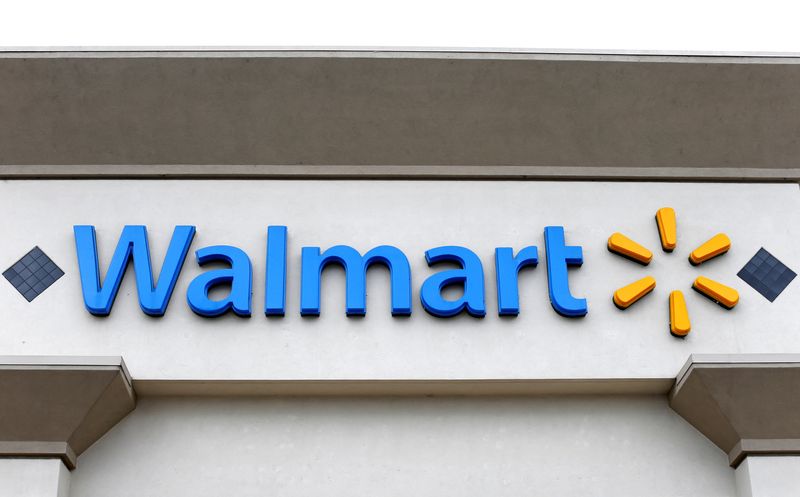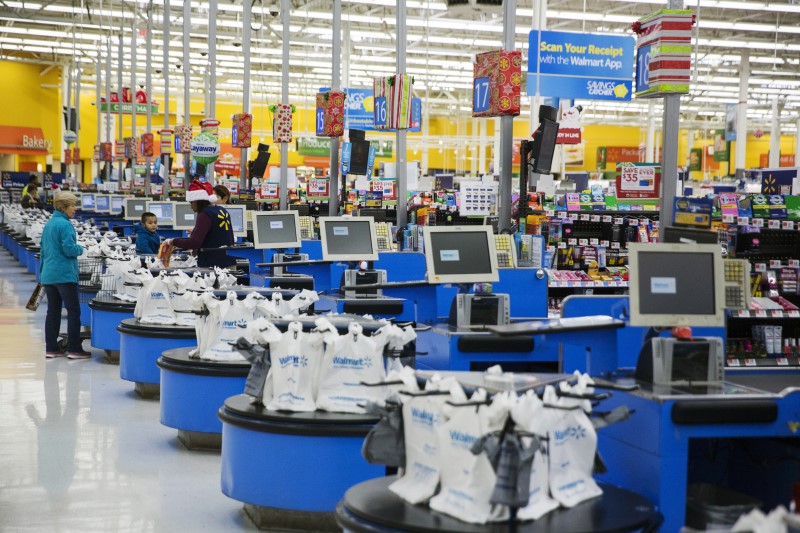
© Reuters. FILE PHOTO: The logo of Down Jones Industrial Average stock market index listed company Walmart is shown on one of its stores in Encinitas, California April 13, 2016. REUTERS/Mike Blake/File Photo
By Siddharth Cavale
BENTONVILLE, Arkansas (Reuters) – Walmart (NYSE:) still expects to double the amount of gross merchandise volume it sells in foreign markets to $200 billion in five years, a top executive at the retailer said on Friday, even as the global economy remains on shaky ground.
Gross merchandise volume (GMV) measures the total value of all goods sold through a platform or marketplace, which in Walmart’s case includes its Cashi digital payments app platform in Mexico and Flipkart marketplace in India.
“It is a pretty ambitious target. The markets that we have today have plans to be able to get there,” Judith McKenna, Walmart International’s CEO, told analysts at a meeting in Fayetteville, Arkansas, near the Bentonville headquarters of the world’s largest retailer by sales.
The analysts meeting and a press presentation by Walmart CEO Doug McMillon were held on Friday in conjunction with the retailer’s annual shareholders meeting in Bentonville.
Five years ago, Walmart International generated about $120 billion in GMV. But after it divested its businesses in Brazil, Argentina, Japan and the United Kingdom, the number slipped to $100 billion in the year to Jan. 31, 2023.
McKenna in April first announced the expectation of doubling Walmart’s foreign GMV. She expressed continued confidence on Friday even as the International Monetary Fund revised down its global economic growth forecasts for 2023 and 2024, citing persistent inflation.
Walmart’s business model has evolved over the past few years, with a greater focus on omni-channel – a strategy that ties together its e-commerce business, delivery services, advertising and marketplace business. McKenna said Walmart’s huge size and technological breadth will give it the leverage to scale this strategy more quickly.
McKenna said she expects Walmart’s growth to come from implementing the omni-channel strategy globally, scaling existing and new marketplaces in the 19 foreign countries in which it operates, and building a complementary business “ecosystem” like the one it has in Mexico.
Besides selling everyday products through brick-and-mortar stores in Mexico, Walmart offers financial services through its Cashi app, telecom services through BAIT and has now started offering healthcare services in the country.
Walmart’s omni-channel efforts have been a boon for the retailer as recession fears push more Americans to seek bargains in groceries. Inflation continues to be persistent in dry groceries, the company said. With more of family budgets being spent on food, Walmart and other retailers are rethinking how they price apparel, home and other discretionary products or are resorting to more discounts.
To prod customers to open up their wallets, McMillon told reporters, the company will offer low prices for the upcoming back-to-school season. Walmart will be focused on low prices for notebooks or pens or pencils and will offer a lot more quantity and alternatives that shoppers can choose according to their budget, McMillon added.


